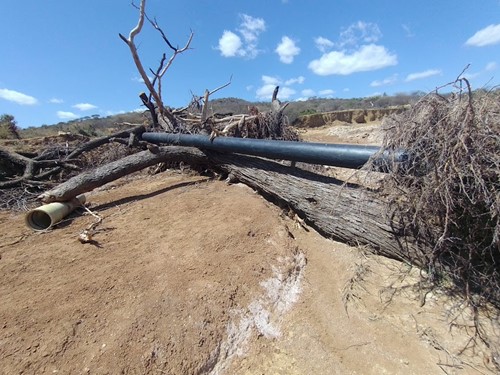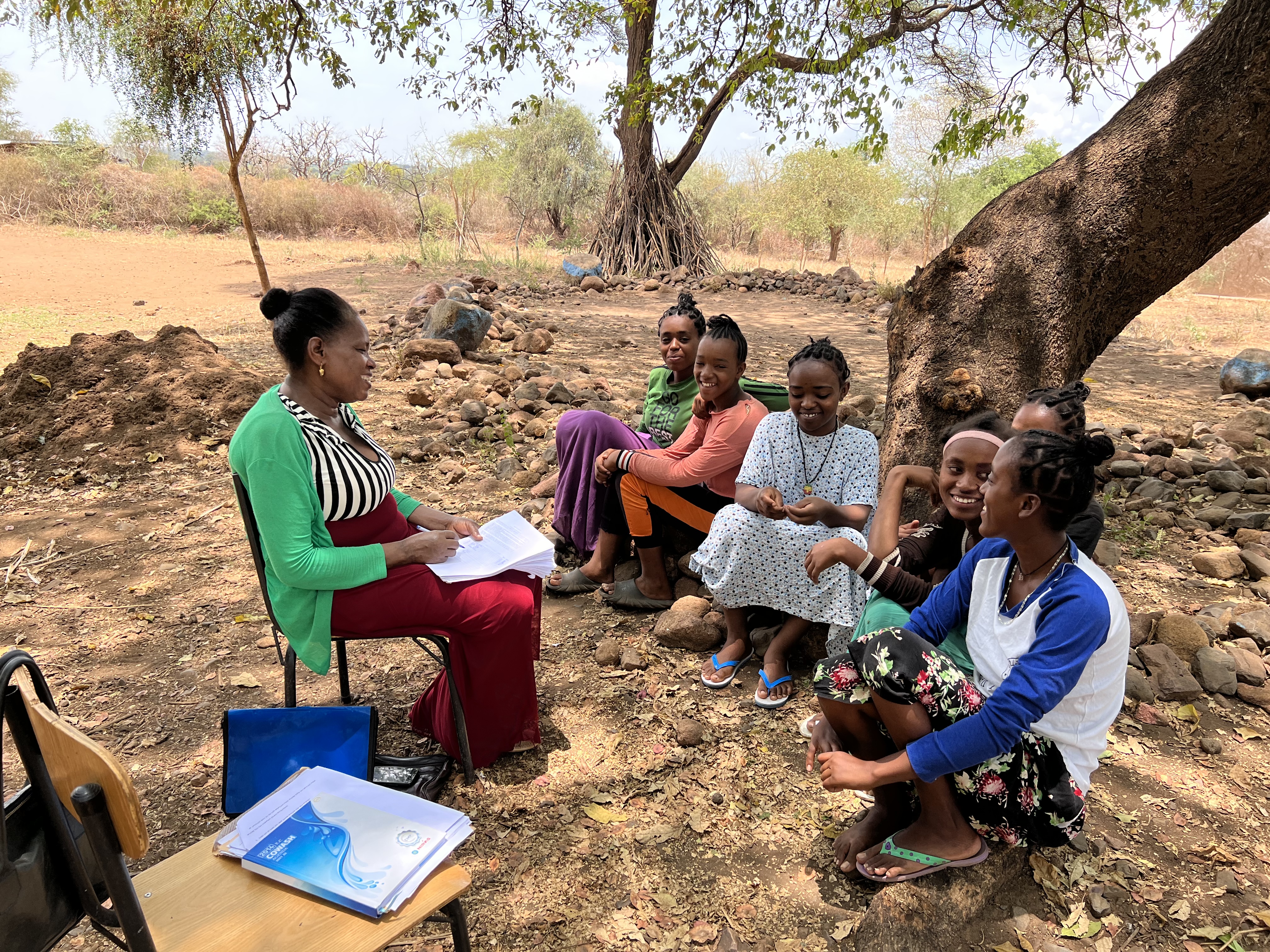Project
Building the long-term resilience of safe water supply systems in 13 regions of drought-prone Ethiopia

Awada Boricha water source spring in Sidama Regional State, Ethiopia.
Project
Awada Boricha water source spring in Sidama Regional State, Ethiopia.
The UK is the lead bilateral donor in the water, sanitation and hygiene sector (WaSH) in Ethiopia. Through this support, the British Government assisted the 'Climate Resilience' pillar of the Ethiopian Government’s flagship One WaSH National Programme through the Strengthening Climate Resilience Systems in Water Sanitation Hygiene Technical Assistance Project (SCRS-WaSH-TAP). In partnership with Water Aid, NIRAS delivered expert advice to strengthen climate-resilient delivery systems in drought-affected areas and amplify the impact of financial aid provided to the Ethiopian Government. The project concluded in February 2025 with a closing workshop to celebrate it's significant successes.
Ethiopia, a country characterised by its diverse landscapes and extensive highlands, is increasingly vulnerable to the impacts of climate change. These impacts manifest as more frequent and severe weather events, such as droughts and floods, which threaten the water security and sanitary conditions of millions of people. The current drought, which began in late 2020 has affected more than 13 million people resulting in severe water shortages and disease outbreaks. The importance of water, sanitation, and hygiene (WaSH) cannot be overstated given their fundamental role in health, survival, and the overall development of communities. Yet, the resilience of WaSH systems to climate-related shocks remains perilously low in many regions of Ethiopia.
“The UK-funded SCRS-WaSH-TAP, the first of its kind focusing on key post-construction sustainability pillars and national strategies, has been instrumental in bringing transformational changes to the communities as well as national, subnational, and local institutions. The achievements made in creating business-oriented rural utilities and women-led micro enterprises ensurng sustainable service delivery, and the piloting of innovative menstrual hygiene management products to address period poverty have set great benchmarks for Ethiopian WaSH sector development. FCDO is also very proud of developing Ethiopia’s first Finance Strategy for the WaSH sector, which has defined robust resource mobilisation options to enable Ethiopia to achieve the SDGs.”
Martha Solomon, Lead WaSH Advisor and Deputy Team Leader at the British Embassy in Addis Ababa
Recognising the urgent need to address these challenges, the UK worked with the Ethiopian Government through a programme called ‘Strengthening Climate Resilience Systems in Water Sanitation Hygiene Technical Assistance Project (SCRS-WaSH-TAP)’. This initiative was part of a broader commitment to support sustainable development and climate adaptation strategies in vulnerable regions across the globe. The project's objective was to enhance the capacity of local systems, ensuring they are robust enough to withstand the increasing unpredictability and severity of climatic conditions.
After three years of implementation, SCRS-WaSH-TAP has created ripples of undeniable change in Ethiopia. These were celebrated in a closing workshop hosted by NIRAS and the UK Foreign, Commonwealth & Development Office (FCDO) in collaboration with the Government of Ethiopia’s Ministries of Water and Energy, Finance, and Education. This event brought together stakeholders from key federal ministries and regional bureaus for water and energy, and job creation as well as development partners. It also saw the attendance of the end beneficiaries, managers and technical experts from multi-village water utilities, women and youth from micro and small enterprises (MSEs) and teachers and students from schools who shared their experience and how they have benefited from the project.
SCRS-WaSH not only focused on the integration of climate-resilient practices into WaSH programmes, the project also sought to improve immediate access to essential services and lay a foundation for sustainable, long-term environmental and social health. This involved a multi-faceted approach, including the development of innovative technologies, strengthening of institutional frameworks, and community engagement.

Goals and beneficiaries: SCRS-WaSH in short
Supporting three types of beneficiaries – at the federal, regional and facility level – across 12 regions and one city administration, SCRS-WaSH set out to transform water management and sanitation practices in Ethiopia. It had multiple objectives starting with fortifying the management of water supply systems in 30 rural multi-village schemes to transition them into sustainable business models and integrating climate resilience and mitigation strategies into existing and new water supply schemes.
The initiative also aimed to establish robust post-construction maintenance systems and supply chains for spare parts, which will enhance the functionality of the water schemes while creating jobs particularly for women- and youth-run micro and small enterprises. Another goal was the tackling of period poverty in schools by the piloting of private sector solutions for menstrual hygiene management. Finally, the project team worked with the Government to develop the first national WaSH sector financing strategy that emphasised domestic funding sources. A number of finance options were identified and their potential for generating revenue estimated. This is a pioneering achievement that will guide future investments and policies.
The success of SCRS-WaSH-TAP would not have been possible without the collaboration of key agencies. While work remains to be done to scale the efforts and impact of SCRS-WaSH-TAP, government officials from the Ministries of Water and Energy, Finance, and Education reaffirmed their commitment to integrating its success into national WaSH policies and programmes, ensuring that the sector takes forward these gains in support of long-term climate resilience.
"Due to the limited availability of water, we had to use unprotected ponds for our drinking needs. Thanks to the restoration of the public standpoints (known as "bono"), this has been resolved. Now we not only get access to clean drinking water but we also can use the system to cultivate our gardens and grow vegetables. To make sure this water supply lasts, it’s really important to upgrade the electric power supply system and establish the household connections.”
Kassim Abdulahi, villager from Erer Woreda Marko Kebele, Samte, Harari Region
Climate resilience and gender and social inclusion are themes that cut across all project activities. The SCRS-WaSH project team collaborated with the Ministry of Water and Energy - particularly the Water Supply and Sanitation Infrastructure Management Directorate and Water Supply Study, Design and Construction Monitoring Directorate - as well as the ministries of Health; Education; Finance; Women and Children Affairs; and Labour and Job Creation, and their respective regional bureaus in the intervention regions.
Strengthening management systems
A key success of SCRS-WaSH-TAP was its strengthening of the management and operational systems of 30 climate-resilient rural multi-village water supply schemes, all of which have substantially improved service delivery with increased revenue generation. The project team worked mostly with Ministry of Water and Energy departments, respective regional bureaus, and locally with the schemes directly to diagnose strengths, weaknesses, gaps, and bottlenecks and develop and implement plans for improvements in their operations.
A big part of the work was the technical and managerial training given to multi-village scheme utility board members and staff on topics such as water tariff setting, GIS mapping, asset management maintenance, and reducing non-revenue water. Customised training is offered on developing business plans that ensure sufficient supply and quality of tools and equipment.
Major improvements in the performance of these multi-village schemes operations has been achieved in many areas including governance and policy, non-revenue water loss, billing and fee collection, income, financial and human resources management, customer satisfaction and operations and maintenance.
people affected by drought in Ethiopia
multi-village scheme utility board members and staff trained
Climate-Resilient Water Safety Plans prepared and validated and support for implementation underway
Supporting the development of climate-resilient water safety planning
To improve the climate resilience of water resources in drought-prone areas targeted by the project, 29 Climate-Resilient Water Safety Plans (CRWSPs) were drawn up in collaboration with government stakeholders. This involved assessing the implications of climate change at every part of the water supply chain, from rainfall reaching the catchment through to the end user. Depending on the location, risks can include not only reduced supply and interrupted service delivery, but also extreme events such as flash flooding that can cause major damage to water supply infrastructure.
SCRS-WaSH brought the development of these plans to a new level by incorporating advanced tools to assess the vulnerability of catchments. These include GIS with satellite imagery; source catchment delineation; mapping and analysis of current land use, landscape area degradation and flood risk; downscaling of climate data to the basin level: hydrogeology/ aquifer characterisation; type and nature of the aquifers – including lithology, aquifer size, flow direction; and identification of recharge area. Joint field work was carried out with government and utilities to increase knowledge on the resource base through monitoring and overall planning and support to the implementation of the catchment management and WSPs.
Overall, these CRWSPs have led to tangible improvements in catchment restoration, soil conservation and water resource management and there is heightened awareness of climate change and environment-induced risks posed to water supply, including the introduction of improved structural designs for scheme infrastructure to address flood risks.

Gearing women and youth up to establish and run micro-to-small maintenance and spare parts supply businesses
SCRS-WaSH successfully achieved its goals of supporting women- and youth-run micro and small enterprises (MSEs) for the provision of maintenance services and spare parts supplies to water supply facilities. At the project's conclusion, 30 MSEs been set up and trained and had generated jobs for 353 people, 62% of whom were women. The training included support on business plan development and marketing strategies as well as connections to market outlets and equipment to start up operations. Over 60 technical and vocational education trainers and other experts received training so they can, in turn, train others. At least ten regional bureaus have agreed to, or are providing working premises for these businesses and apprenticeships are underway for them to deliver services in collaboration with urban water utilities and cluster woreda water and energy offices to maintain water infrastructure systems.
SCRS-WaSH-TAP significantly strengthened systems at the federal, regional and local levels to achieve sustainable, inclusive and climate-resilient WaSH service delivery. Specifically, the project’s key achievements include:
Through these notable achievements, SCRS-WaSH-TAP showed that even minor investments in technical assistance can restore many non-functional systems, recover costs and result in transformative improvements in service delivery, underscoring the importance of robust post-construction management.
women, men, and youth involved in micro and small businesses supported with training
micro and small businesses established
"When I first experienced my first period, I was shy and concerned whether girls would see my period or if it leaks. Even after becoming a teacher, we wouldn’t tell others. But now we train students on open discussion and that period should not be a taboo. I encourage them to come to me and tell me and not to be shy to talk with parents and other teachers about it."
Gender club leader, Afar school
Keeping girls in school
With the overall goal of improving girls’ school attendance and educational performance, the SCRS-WaSH team provided reusable menstrual hygiene kits (four reusable pads in a kit) together with two pairs of underwear to 150 schools, benefiting 35,000 girls and reducing absenteeism. The project also supported local businesses that produce and sell menstrual hygiene products.
In addition to making these products more accessible, the project developed behavioural change materials that were shared with the schools to create awareness and breakdown taboos. This was targeted at boys and girls as well as teachers and parents. There was also a training of trainers for Gender Club leads and School Directors in Afar, Amhara, Benishangul Gumuz, Dire Dawa, Harari, Oromia, Sidama, the former SNNPR, and Somali. This has cascaded down to enhance awareness, ownership, and sustainability of these gains among the community.

35,000 girls received reusable menstrual hygiene kits over the course of the project
SCRS WaSH brief
Unlocking financial pathways: A strategic overview for repayable finance opportunities in Ethiopia’s WASH sector
Lessons & Challenges: Adoption of Climate Resilient Water Safety Plans in Ethiopia
Unlocking sustainable finance
Improving Access to good quality water meters

